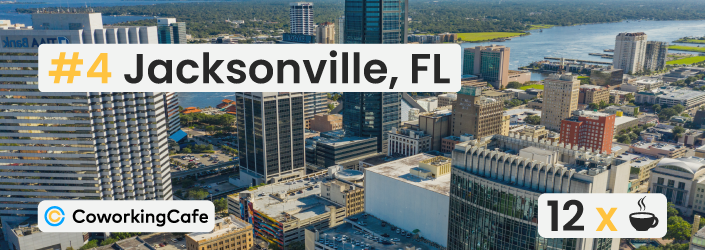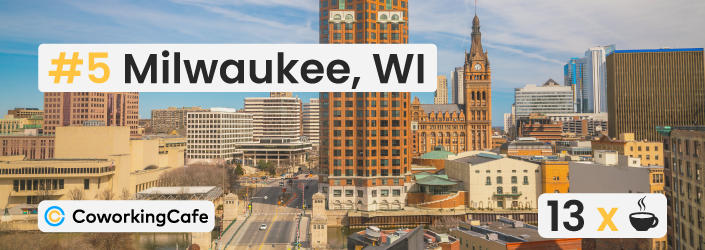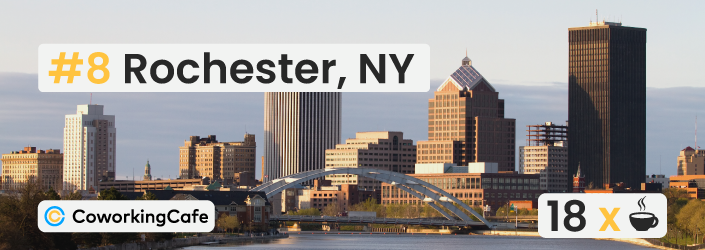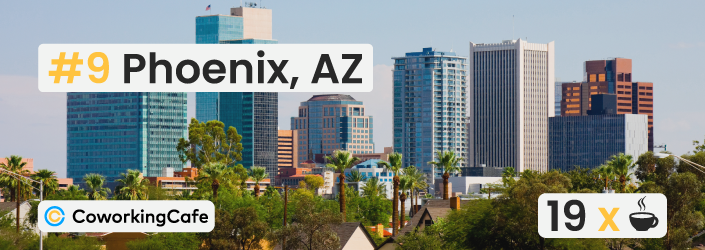Key Takeaways:
- In 10 U.S. cities, the cost of working from a coworking space rather than from home amounts to less than a basic monthly coffee budget – $100.
- The lowest price gap between coworking and working from home WFH is registered in Roseville, CA, where workers can upgrade to a coworking space for the equivalent cost of seven coffees a month ($37).
- Hartford, CT and Mesa, AZ are the other cities where the extra cost of coworking stands at a maximum of $50 per month.
- At the state level, California and Arizona are the ones that check two cities each where it costs less than $100 per month for a coworking space instead of WFH.
Inflation is driving up the price of everything as rising interest rates force businesses to pull back and examine just how they’re spending their money. And, with nearly one-third of Americans still working from home (WFH), reports have clearly shown that this model is saving companies significant amounts of money. But, unfortunately, WFH can also foster feelings of isolation among workers.
However, as a flexible and cost-effective alternative to the traditional office model, coworking spaces across the U.S. are bridging this gap. Of course, for those looking to work and socialize in a professional setting, but without any extra costs – well, the bad news is that something has to give. The good news, though, is that, in 10 U.S. cities, it only takes the cost of one cup of coffee per day to balance the coworking price with that of WFH. That’s not too shabby, especially considering that most coworking spaces make up for it by providing free coffee anyway as part of their subscription prices (on top of the many other benefits, from certain tech gear to networking opportunities).
So, to compile the locations with the lowest price gaps between coworking and WFH, we considered the average monthly price for open workspaces in 48 U.S. cities that had a minimum of five coworking spaces each. We then compared that amount to the costs of WFH as depicted by utilities, by estimating the total monthly price of utilities used while working from home as 15% of the total monthly utility expenses. Accordingly, we also considered the amount represented by that 15% as money saved if the worker chose another location, like a coworking space. Notably, due to the highly variable nature of commuting, this additional cost was not part of the analysis.
In Roseville, CA, & Hartford, CT, It Takes Less Than $50/Month to Choose Coworking Instead of WFH
Our analysis revealed that, in 10 cities across the nation, workers could leave their home desks in favor of coworking for an extra cost of less than $100/month.

Believe it or not, not only does California claim two cities with affordable coworking, but it’s also home to the leader of our ranking: in Roseville, workers could trade their home desk for an open workspace in a coworking site for the price of seven coffees per month. Here, the monthly average coworking price stands below $100 ($93, specifically), which means that opting for a flex workspace instead of staying in would only set workers back by $37. That’s a small price to pay for all of the benefits brought forth by a coworking space, like the tech amenities, ergonomic furniture, and many social and networking opportunities. At the same time, considering the infamous California traffic, a coworking space within closer proximity of one’s home could also save valuable time, even when used in conjunction with days working from home or from a traditional office.

On the East Coast, $40 (or eight coffees per month) is all it takes to enjoy the previously mentioned benefits of coworking in Hartford, CT, as opposed to working from what is now an all-too-familiar home setting. Here, the average monthly price for an open workspace is the same as in Roseville ($93), and not being home during those eight to nine working hours could save residents $53/month. Plus, with Hartford being the home of more than 100 insurance companies and many others operating in financial-based industries, coworking could come in handy for many workers who need to spice up their day and make new connections through events and networking.

Locals could take advantage of the sunny weather and walk to the closest coworking space in Mesa. And, with a healthy stock of 12 such spaces across the city, it could be quite easy to find one close to home (which would be a great alternative to facing traffic on the 202 or 101 in order to commute to downtown offices on a daily basis). More precisely, workers in Mesa would need to put forth roughly $50 per month (or the equivalent of 10 takeout coffees) to make the switch to a coworking space. That’s not a bad deal, considering that the average American drinks up to three cups of coffee a day. And, coworkers will likely find a fully stocked kitchen in their space of choice (which includes coffee), in addition to other useful amenities, like printers, scanners, mail handling services and more.

Naturally, when compared to working from home, coworking also costs a little bit more in Jacksonville. But, that doesn’t mean that workers aren’t willing to pay that relatively small price. This is clear by the number of coworking spaces in the area (26) that cater to the demand coming from remote workers, freelancers or other entrepreneurs. Here, the average monthly price for an open workspace reaches $113. As such, the gap between coworking and WFH accounts for only $58/month (or, simply put, 12 cups of coffee). Furthermore, with Jacksonville hosting top industries like tech, financial services, and healthcare, it’s safe to say that coworking is a convenient solution for those who work remotely or in a hybrid manner and are looking for extra amenities and services.

Up north, workers in Milwaukee could get an open workspace at a coworking site for the monthly price of $116, which translates to 13 cups of coffee. While that is slightly higher than the previous locations, it actually only tips the balance by one more cup of coffee per month compared to Jacksonville. How so? Well, here, coworking is only $67 more expensive than working from home. Additionally, the available stock of 21 coworking spaces also makes it easy for workers to find a location within close proximity of their home. Thus, they would reduce or eliminate their commute, thereby saving both time and money.

Boasting the second-highest number of coworking spaces (33) in our top 10, Indianapolis offers plenty of convenient solutions for workers in the area. In particular, the average monthly price for an open workspace comes in at $130, while the amount saved in utilities by those who shun WFH is the same as in Milwaukee ($49 per month). As a result, the difference in pricing between coworking and working from home stands at $81, or the equivalent of 16 coffees a month. Even so, coworking spaces in Indianapolis generally provide great value for money, and the flexible workspace trend is one that pays off for many.

As a prominent regional financial center, St. Louis hosts a large range of industries. In fact, it was recently counted among the top 25 fastest-growing cities — a sign of its ability to attract and retain residents. And, the great news for remote workers in St. Louis is that coworking is a viable option that won’t break the bank. While working from the comfort of their own homes will add around $51 per month to the total utility bills, that amount can easily be redirected toward coworking. In this case, workers would need to pitch in another $81 dollars per month to reach the average coworking subscription price of $133. In coffee cups, that comes down to 16, the same as Indianapolis.

In Rochester, the average monthly coworking price reaches $149. But, even staying home would add $58 more to the total utility bills. So, at the end of the day, workers who choose coworking could do so for a price difference of $91. That’s the equivalent of 18 cups of coffee per month, which, if we consider working days, comes down to less than one cup of coffee a day. And, with coworking bringing so much more to the table, it’s easy to see why trading in the same four walls for a lively, creative space with top-notch amenities might be a convenient solution for many.

It would be a shame to spend all day indoors in sunny Phoenix. For this reason, a brisk walk to a coworking space is not only a great way to unwind and take in the desert view, but also to avoid the tedious traffic and long commutes. Plus, the other great news for workers in Phoenix is that choosing coworking as opposed to WFH would still cost less than $100 per month (more precisely, $95). Furthermore, among the cities in our top 10, Phoenix boasts the highest number of coworking spaces (39), thereby making proximity to one a non-issue. At the same time, it would only take the price of 19 cups of coffee each month to be able to afford the monthly membership for an open workspace here.
 Back in the Golden State, Glendale marks California’s second entry in our ranking. As one of California’s leading office markets, Glendale is known to excel in the business scene. Here, the difference between working from home and coworking comes down to a pricing gap of $98. Remote workers, freelancers or entrepreneurs in this area can book an open workspace in a coworking setting for an average of $157 per month. And, comparing that to the costs of working from home, the difference could be translated into 20 cups of coffee per month, or an average of one coffee per workday
Back in the Golden State, Glendale marks California’s second entry in our ranking. As one of California’s leading office markets, Glendale is known to excel in the business scene. Here, the difference between working from home and coworking comes down to a pricing gap of $98. Remote workers, freelancers or entrepreneurs in this area can book an open workspace in a coworking setting for an average of $157 per month. And, comparing that to the costs of working from home, the difference could be translated into 20 cups of coffee per month, or an average of one coffee per workday
While some workers leverage the remote policy by working from home, the lack of a professional setting with useful amenities is driving many others to choose coworking. Similarly, the need for socializing and interacting with other professionals — either from the same industry or a completely different one — is certainly strong after years of limited social contact. Consequently, coworking spaces come as a convenient, flexible, and affordable solution for those who are looking to switch up their work environment, join a community, and even boost their creativity and productivity.
Methodology
- To calculate the costs of electricity for this study, we used data from ipums.org and focused our analysis on the 102 cities for which this information was available. We then narrowed the total number of cities to 48 by only considering those that had at least five coworking space locations, as depicted by our own data.
- For the costs related to the water bills, we looked at local water and wastewater company rates (service charge plus consumption rate per 1,000 gallons) for the 48 cities we analyzed, multiplied by consumption estimates (from the U.S. Geological Survey) for the average household size.
- To determine the natural gas costs, we leveraged data from eia.gov.
- Based on the percentage increases in utility consumption during the pandemic years (10% in electricity and 21% in water), we estimated that 15% more was used during the hours when remote workers worked from home, as opposed to the same hours when they were away.
- The monthly average coworking cost was based on proprietary data. We calculated the average cost for an open-workspace arrangement in coworking spaces from each city.
- For this study, we did not consider the cost of commute, as it’s highly volatile in nature and depends on too many factors to accurately quantify.
Fair Use & Redistribution
We encourage and freely grant you permission to reuse, host or repost the images in this article. When doing so, we only ask that you kindly attribute the authors by linking to CoworkingCafe.com or this page so that your readers can learn more about this project, the research behind it and its methodology.







